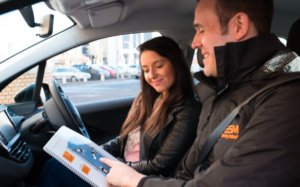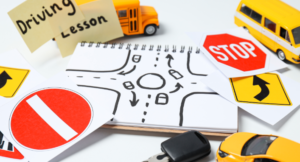Learning to drive is an essential life skill that provides independence, convenience, and freedom. When you start driving lessons, one of the first decisions is whether to learn in a manual or automatic car. Both transmission types have advantages, and your choice can impact your learning experience, test pass rates, and long-term driving habits. This guide will explore the differences, benefits, and considerations of manual and automatic driving lessons to help you make an informed decision.
Understanding Manual and Automatic Cars
What is a Manual Car?
What is an Automatic Car?
An automatic car does not require the driver to change gears manually. Instead, the car’s transmission system automatically selects the appropriate gear based on speed and road conditions, allowing the driver to focus on steering and braking.
Benefits of Learning to Drive a Manual Car
More Control Over the Car
Driving a manual car gives you greater control over acceleration, deceleration, and gear selection. This can be particularly useful in driving conditions like hilly areas or slippery roads.
More Affordable Purchase and Maintenance
Manual cars generally cost less to buy and maintain. Their mechanical structure is more straightforward than automatic cars, leading to lower repair and maintenance costs.
Better Fuel Efficiency
Manual cars often offer better fuel efficiency, especially on highways. Since the driver has complete control over the gears, they can optimize fuel consumption.
More Driving Opportunities
you learn to drive a manual car, you can legally drive manual and automatic vehicles. However, if you pass your test in an automatic car, you will be restricted to driving only in an automatic.
Higher Demand in Certain Industries
Many commercial and professional driving roles require the ability to drive manual vehicles. Driving a manual car may open up more job opportunities, such as truck driving, delivery services, and motorsport careers.
Enhanced Driving Skills
Driving a manual car requires better coordination, focus, and multitasking. This often results in more confident and skilled drivers.
Benefits of Learning to Drive an Automatic Car
Easier to Learn
Automatic cars are much simpler to drive since they do not require clutch control or gear changes. This makes learning to drive quicker and less stressful for beginners.
Reduced Stress in Traffic
Driving an automatic car is much easier in stop-and-go traffic without manually shifting gears, reducing driver fatigue and stress.
Faster Progress in Lessons
Many learners find that they need fewer lessons in an automatic car compared to a manual. This can result in saving time and money in the long run.
Ideal for City Driving
An automatic car can provide a smoother and more convenient driving experience if you live in a busy city with heavy traffic.
Lower Risk of Stalling
Stalling is one of the biggest challenges for new drivers in a manual car. Automatic cars do not stall, which helps boost the confidence of new learners.
Accessibility for All Drivers
Automatic cars are an excellent option for individuals with disabilities or physical challenges that make operating a manual clutch difficult.
Manual vs. Automatic
| Factor | Manual | Automatic |
|---|---|---|
| Learning | Takes longer | Easier & faster |
| Control | More vehicle control | Less control |
| Cost | Cheaper to buy & maintain | More expensive |
| License | Can drive both types | Limited to automatic |
| Traffic | Can be tiring | More convenient |
Why Choose Astra Driving School?
- Qualified DVSA-approved instructors with years of experience.
- Flexible lesson schedules to suit your availability.
- High pass rates due to structured and effective training methods.
- Modern, well-maintained manual and automatic vehicles.
- Competitive pricing and lesson packages.
- Friendly and patient instructors who cater to all learning styles.
- Mock driving tests to prepare you for the actual exam.
Whether you prefer to learn in a manual or automatic car, our expert team guides you every step of the way.
Conclusion
Choosing between manual and automatic driving lessons depends on your driving goals, lifestyle, and preferences. Learning in a manual car provides greater flexibility, control, and cost-saving benefits, while learning in an automatic vehicle offers a more leisurely, stress-free experience, particularly for city driving. Regardless of your choice, professional training with Astra Driving School will ensure you develop the necessary skills to become a confident and safe driver.
FAQs,
Can I drive a manual so I pass my test in an automatic?
No, if you pass your test in an automatic car, you are only permitted to drive automatic vehicles. You need to pass a manual driving test to drive a manual car.
Is learning to drive a manual harder than an automatic?
Manual cars require more coordination because you must operate the clutch and gear stick, making them more challenging for beginners.
Are automatic lessons more expensive than manual lessons?
Yes, automatic lessons are often more expensive because automatic cars cost more to purchase and maintain.
Are manual cars better for long-distance driving?
Manual cars offer more control over speed and fuel efficiency, making them a good option for long-distance driving.
Will automatic cars replace manual cars in the future?
Automatic cars are becoming more popular as technology advances, but manual vehicles are still widely used.
Do automatic cars have better fuel efficiency?
Older automatic cars were less fuel-efficient, but modern automatic vehicles now offer fuel efficiency comparable to manual cars.
Is an automatic license accepted worldwide?
Many countries allow driving with an automatic license, but some may require additional testing to drive a manual car.
Should I learn automatically if I struggle with the manual?
If you find manual driving difficult, switching to automatic can make learning easier and faster.







2 thoughts on “Manual & Automatic Driving Lessons: Which One is Best?”
Pingback: How to Drive an Automatic Car: A Guide for Learners in Manchester
Pingback: Driving Classes for Manual Transmission UK | Astra Driving School